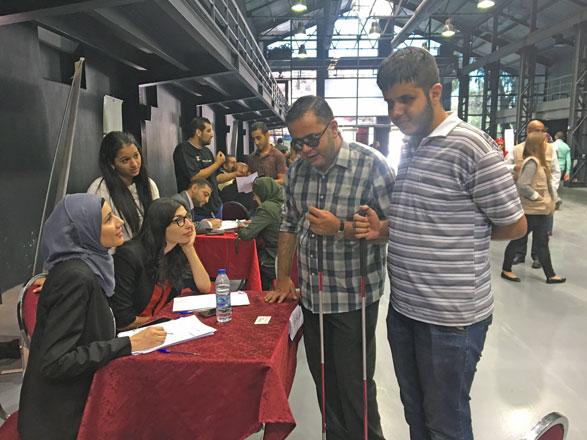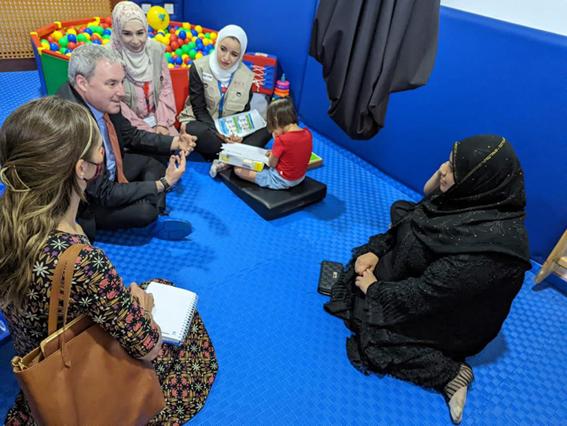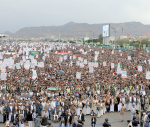You are here
Job fair gives work opportunities to people with disabilities
By Sawsan Tabazah - Sep 04,2018 - Last updated at Sep 04,2018

Two men with visual impairment are seen applying for jobs at the job fair in Ras Al Ain Hangar on Tuesday (Photo by Sawsan Tabazah)
AMMAN — People with partial disabilities have higher chances to get jobs than people with complete disabilities, activist and jobseeker Hadeel Abu Soufeh stated on Tuesday, during a job fair for people with disabilities (PWD) held at Ras Al Ain Gallery in Amman.
The one-day job fair attracted around 350 jobseekers with disabilities, who got to meet with 20 companies from the industrial and services sectors, International Orthodox Christian Charities (IOCC)’s country representative Loren Hyatt, who organised the event, told The Jordan Times.
Each company offered 10 to 20 vacancies for PWDs, which included vacancies for unskilled, semi-skilled and skilled labour in professions like cleaning, packaging and cooking, Hyatt said.
According to 2015 population and housing census, around 11.2 per cent of the Jordanian population aged above 5 years old have a kind of disability.
Abu Soufeh, who holds a degree in food processing from the University of Jordan, believes that employers prefer employing a person with partial visual or hearing impairment rather than a fully blind or deaf person “because they think communication will be easier”.
“Perhaps they do not know it, but there are reasonable accommodations like screen readers or sign language interpretation services that can ease communication between the employer and the employee,” she pointed out.
The new 2017 law for people with disability has defined a commitment for governmental and non-governmental institutions to hire PWDs according to the size of the corporation. For corporations of 25 to 50 employees, at least one person with disability should be hired, while companies with over 50 employees should hire 4 per cent of its workforce from PWDs.
For Mohammad Awadallah, an officer at the Ministry of Labour’s PWD employment department, most companies avoid recruiting people with total disability because workplaces are mostly inaccessible, noting that most PWDs in Jordan work in factories’ production lines.
A wheelchair user herself, Abu Soufeh said that most PWDs with graduate and post-graduate degrees are unemployed because employers think “they are not qualified enough to do the work like a person without a disability”.
She added that a person with physical disability has even lower chances to get a job than people with other types of disabilities due to the lack of accessibility in most institutions around Jordan.
Maher Tadmouri, a Syrian refugee with visual impairment, said that he was rejected by all the places he applied to in Jordan, despite having previous experience in a cake factory in Syria.
For Ghaith Abbadi, an employment expert at the International Labour Organisation, employers believe that employing a PWD is a burden, despite some being very productive.
“The Ministry of Labour must intensify inspection campaigns on companies to ensure higher employment of PWDs,” Abbadi stressed.
Under the two-year “Access and education for Syrian and Jordanian people with disabilities” project, funded by the Austrian Development Cooperation, the IOCC aims at empowering PWDs by connecting them with employers, providing vocational training and job coaching to help them support themselves and their families, Hyatt concluded.
Related Articles
Prime Minister Abdullah Ensour on Monday directed the Labour Ministry to ensure the private sector companies are committed to the law on persons with disabilities (PWDs).
The Civil Service Bureau is working on filling 162 vacancies with persons having disabilities (PWDs) registered with the bureau in coordination with 43 ministries and public departments, bureau president Khalaf Hmeisat said at a press conference on Wednesday.
Turner, who is visiting the Kingdom, had a first-hand look at the activities of the IOCC and IFH that serve the refugees and Jordanians with disabilities at IFH’s clinic in Sweileh.

















